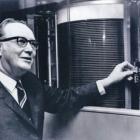After a successful fund-raising campaign, the British Centre for Computing History, founded in 2006, was re-opened in Cambridge on 27 July, in a ground area of nearly 300 square metres, a site larger than the previous facility.
Current news
Microsoft introduced their Office program package on 1 August 1989. The word ?office? was initially intended for marketing purposes to designate a bundled set of office applications.
Intel Corporation was founded 45 five years ago on 18 July 1968 by Gordon E. Moore, famed for his law, and Robert Noyce. Originally, Intel was an American company that grew to be international with time.
The technology focussed magazine Techradar online put together a fascinating list of ten British scientists who shaped and influenced the development in computing to a significant extent.
World- renowned magazine IEEE Spectrum did an enthralling interview with Intel’s engineer Ajay Bhatt, who invented the universal serial bus port 25 years ago, and developed USB 2.0 and 3.0.
Before the advent of computers, special-purpose hardware was used to solve calculating problems even in fields that are rarely mentioned in studies on history.
Bletchley Park, one of Britain’s most important museums to present IT history, now welcomes visitors with a multimedia guide, which is included in the normal admission price.
The inventor and computer pioneer Reynold B. Johnson, nicknamed the “father of the disk drive” in later years, was born on 16 July 1906 in Minnesota.
Between 5-7 July, the Snibston Discovery Museum in Coalville will host a pioneering festival to celebrate the age of micro-chips with a display of vintage computers.
The Past of the Future – From Punched Cards to Information Society conference organised by the John von Neumann Computer Society was held on 25th June at the Albert Szent-Györgyi Agora, home to the Exhibition on ICT History.










